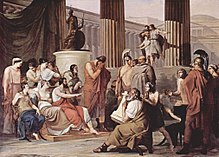Phaiacs

The Phaeacians ( ancient Greek Φαίακες Phaíakes , German also Phaeacians in Latin Phaeaces ) are a people of Greek mythology , which according to Homer's Odyssey in Scheria lived, according to much later written Argonautica of Apollonius of Rhodes on the island Drepane.
mythology
The Phaiaks are characterized by Homer on the one hand as hospitable, on the other hand as reserved towards strangers and not happy to entertain them. They were able to lead a happy and carefree life because Scheria was very fertile due to the prevailing westerly winds and everything there grew in abundance.
According to Homer, the Phaiacs originally lived in Hyperion's fields, near the Cyclops , but were then led to Scheria by Nausithoos , the son of Poseidon and Periboia , as they had been invaded again and again by the Cyclops.
The Phaiacs are said to have been gifted shipbuilders and seafarers who, without a helmsman or oars, sailed their ships across the sea as if they had wings. The women were known for their weaving skills.
When Odysseus reached the beach of Phaiakenland on the last stop of his journey, he met young Nausicaa there the next day, who showed him the way to the city and to her parents' palace. Her mother was Arete , her father King Alcinous , son of Nausithoos . The first thing to do is to win the parents' favor, as their wisdom and advice are respected. When Odysseus enters the city, Athena envelops him in "holy mist", which she pours over his head in order to hide him from the sight of the Phaiacs. Odysseus is amazed at the splendor and wealth of the palace when he enters it. He succeeds in gaining the trust of the royal couple and Alcinous promises to bring Odysseus to their homeland, Ithaca, in a phaiac ship . After competitions and feasts are held in honor of Odysseus the next and the day after that, during which Odysseus reveals his true identity, turns down the tempting offer to marry Nausicaa and enjoy a carefree life in Scheria, the Phaiacs bring him to Ithaca. In order to take revenge on the Phaiacs, the sea god Poseidon transformed the ship that Odysseus took to Ithaca into a rock on the return journey shortly before reaching the port of Scheria.
According to a post-Homeric legend , the name is derived from Phaiax , the son of Poseidon and the nymph Gorgyra (from which the ancient name Kerkyra for the island of Corfu is said to be derived).
Figurative meaning
In a figurative sense of the word, the term Phaeacians used to denote leisurely and plentiful then living people. The poem Der Phäake can be found in the volume Wien literally (1948) by Josef Weinheber , which begins as follows:
I don't have anything else, that's
why I like a good papperl, dear sir:
For breakfast with
a fork I treat myself to a plate of meat, a mug of beer, slide in a gollasch every now
and then
(can of course be a jerk meat ),
a juicy leg meat, not too fat,
otherwise you have your gfrett for lunch.
Friedrich Schiller already described in a two-line (Danube in **) the Phaiacs as people idly living in luxury:
The Phaiac people live around me with shining eyes;
It's always Sunday, the tables are always turning on the stove.
literature
- Otto Jessen : Phaiaks . In: Wilhelm Heinrich Roscher (Hrsg.): Detailed lexicon of Greek and Roman mythology . Volume 3.2, Leipzig 1909, Col. 2203-2219 ( digitized version ).
Web links
Individual evidence
- ↑ Homer, Odyssey 8: 31-33 and 387-389
- ↑ Homer, Odyssey 7: 32-33
- ↑ Homer, Odyssey 5:34
- ↑ Homer, Odyssey 6: 4-5
- ^ Homer, Odyssey 6.5-10
- ↑ Homer, Odyssey 8,557-563
- ↑ Homer, Odyssey 7: 109-111
- ↑ Homer, Odyssey 6: 139-141
- ↑ Homer, Odyssey 9:19
- ↑ Homer, Odyssey 13,119; Hyginus Mythographus , Fabulae 125
- ↑ Homer, Odyssey 13, 159-164
- ↑ For example in Leonid Arbusow's Grundriss der Geschichte Liv-, Est- und Kurland (Riga 1908, Reprint Hannover 1972), p. 267: “A Phäakentum has not developed here. The landlord lived on his property, among the peasants; For the greater part of the year, the economy, to which he devoted himself to the smallest detail, tied him to his seat. ”- For use in Vienna cf. Adolf Hitler's Mein Kampf (Munich 1925), p. 20: "Five years of misery and misery are included in the name of this Phäakenstadt for me."
- ↑ Josef Weinträger: Vienna literally. Poems. Hoffmann and Campe, Hamburg 1972, p. 71 f.
- ↑ Der Phäake , in Oesterreichische Poesie. An anthology. Wine lifter poems 1.
